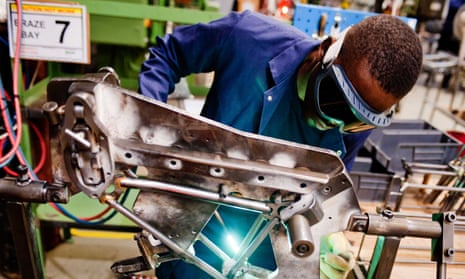Britain’s workers have started to repair the damage from a lost decade of wage growth after increased competition for workers pushed the government’s preferred measure of pay to its highest level since the UK was deep in recession a decade ago.
The latest health check on the labour market from the Office for National Statistics showed that regular pay – which excludes bonuses – was 3.1% higher in the three months ending in August than in the same quarter a year earlier.
The ONS said regular pay had not been growing at a faster rate since the final three months of 2008, the period when the government had to bail out UK banks following the collapse of Lehman Brothers.
But it added that the acceleration in wages growth in recent months still left real pay – adjusted for the impact of price increases – £11 a week lower than it was before the financial crisis erupted.
Annual pay growth including bonuses also edged up in the latest quarter, from 2.6% to 2.7% – barely keeping pace with rising prices.
The ONS head of labour market statistics, David Freeman, said: “People’s regular monthly wage packets grew at their strongest rate in almost a decade but, allowing for inflation, the growth was much more subdued.”
The Bank of England’s monetary policy committee concentrates on movements in regular pay when assessing wage pressures in the economy, and has been predicting that the fall in unemployment to its lowest level since the mid-1970s would lead to a pick-up in earnings.
Threadneedle Street’s regional agents have been reporting that firms are having more difficulty finding staff, a finding supported by the entertainment group Merlin. The company that runs Alton Towers, Legoland and Madame Tussauds warned in its latest financial results that cost pressures were building as a result of tighter labour markets in London and the south-east.
Merlin’s chief executive, Nick Varney, said: “This follows a number of years of legislation-driven cost pressures in the UK leisure industry, including the unconsulted introduction of the national living wage, apprenticeship levy and a significant increase in business rates.
“While the picture of near full employment in these regions is good news at present, to make this wider reaching throughout the UK and sustainable in the case of any shock or downturn, the government needs to support entry-level jobs. It could do this by increasing the threshold for national insurance contributions, allowing employers to attract more people into work and invest in skills development.”
Alok Sharma, the employment minister, said he was encouraged by the rise in wages, adding that it was the seventh month in a row that regular pay had outstripped inflation.
But the TUC said the tightening of the labour market was still not leading to decent pay increases. Its general secretary, Frances O’Grady, said: “The government should use the budget to fund a new deal for public-sector pay, which is barely growing in real terms. And the prime minister must make sure that work pays by raising the minimum wage to £10, cracking down on insecure work, ending unfair pay for agency workers and banning zero-hours contracts.”
Stephen Clarke, senior economic analyst at the Resolution Foundation, said: “Britain’s jobs surge is at last feeding through to higher wages, with pay packets growing at their fastest rate since the financial crisis almost a decade ago.
“This pay momentum is very welcome, reflecting a tight labour market with near record numbers of people in work and unemployment at a 43-year low. However, it comes off the back of a truly awful decade for wages.
“Further pay gains may come from falling inflation in the months to come, but sustaining them will require faster productivity growth in the months and years ahead.”
The latest ONS figures showed little movement in employment or unemployment in the latest quarter. Employment fell by 5,000 to 32.39 million, while unemployment dropped by 47,000 to 1.36 million. The unemployment rate remained at 4%.
Samuel Tombs, a UK economist at Pantheon, said there was no need for the MPC to respond to the pick-up in earnings with a fresh increase in interest rates.
“The MPC needn’t worry that wage growth is about to get out of control, given the renewed weakness in demand for labour and the remaining pockets of slack,” Tombs said.
He added that one reason for the pick-up in earnings had been higher pay for NHS workers in July, which had not been replicated across the rest of the public sector.
